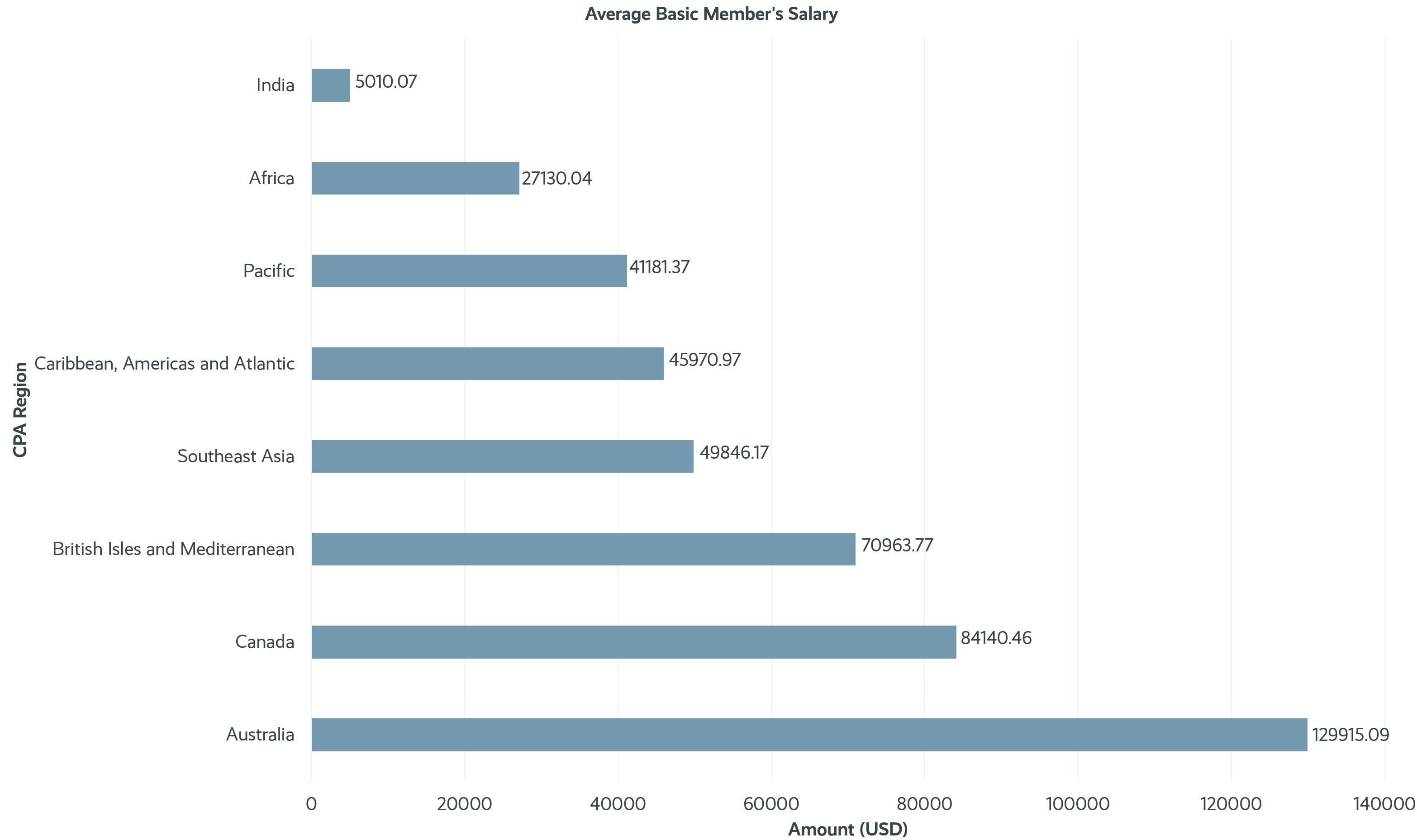
19 minute read
ANALYSIS
This analysis section seeks to identify trends and patterns in the data. Our previous survey, A Survey of Remuneration paid to Members of Parliaments and Legislatures of the Commonwealth, 2004-2005, has been used to draw comparisons. All figures have been converted to US Dollars to allow them to be compared. When continents, regions or countries are referred to in this analysis, please note that this includes those parliaments who have responded to the Survey only. When countries and regions are referred to it is in relation to their respective CPA Branches or Regions.
Lower House
Members in the Parliaments of Australia, Canada and Singapore are the top three to receive the highest basic salary across the Commonwealth. Members in West Bengal, India (Federal) and Sri Lanka are the bottom three in terms of basic salary across the Commonwealth.
The CPA Australia Region has the highest basic salary for Members at an average of approximately AUD $170,108.57 (USD $132,003.40). The CPA India Region has the lowest basic salary of Members at an average of approximately INR 372,000 (USD $5,119.11). Members in the Australia, the British Isles and Mediterranean (BIM) and Canada Regions all receive the average highest
In our lower house findings, we found that the basic salary of Members is highest in the Parliament of Australia at AUD $211,250 (USD $163,936.34) per annum. The Member’s basic salary is lowest in West Bengal at ₹120,000 (USD $1,651.34) per annum.
basic salary across the Commonwealth. Members in the Africa, Asia, and India Regions all receive the average lowest basic salary across the Commonwealth.
In the Parliament of Australia, there has been a 97.86% increase approximately in the basic salary of Members since 2005. In the Parliament of Singapore, since 2005 the increase has been by 34.62% and in the Parliament of Canada this increase has been by 26.54%. In comparison with our previous survey in 2005, we found that the Members basic salary across the BIM Region has increased by an average of 234.29%. In the Australia Region, the basic salary of Members has increased by an average of 62.86% since 2005, in the Canada Region the basic salary has increased by 69.19%, in the Caribbean, Americas and Atlantic (CAA) Region salaries have increased by 1790.32%, and in the India Region, the increase has been by 77.78%.
Across the Commonwealth, we found that a Member’s basic salary is the lowest paid position in the lower house, with the exception of Saint Helena, where the lowest paid position is Deputy Speaker of the House. In Bangladesh, Niue, and Zambia there is no additional pay for committee chairs. Likewise, there is no additional pay as opposition whip in Bangladesh or Sri Lanka. The basic salary of Members is the same as the Clerk of the House in The Gambia.
The Clerk of the House receives the highest salary in the lower chambers of Bermuda, Guernsey, the Isle of Man, New Zealand, Northern Territory, Pakistan (Federal), Punjab (India), Scotland, Sri Lanka, Uttarakhand, Wales, West Bengal, Zambia, and each provincial parliament in Canada. The Speaker receives the highest salary in Cyprus, The Gambia, Malaysia and Western Cape. Cabinet ministers receive the highest salary in ACT, Barbados, Fiji, New South Wales, Saint Helena, Singapore, Trinidad and Tobago, the Turks and Caicos, Victoria, Western Australia and Western Cape. The Leader of the House receives the highest salary in ACT, Bangladesh, Gibraltar, Guyana, Niue, Queensland, South Australia, and Tasmania.
In the responses we received from African legislatures, ministerial and presiding officers salaries are not in addition to the basic salary of Members. This trend was also seen in the following Branches: ACT, Bangladesh, Barbados, British Columbia, Fiji, Guyana, the Isle of Man, New Zealand, Niue, Pakistan, Punjab (India), Queensland, Solomon Islands, South Australia, Sri Lanka, Saint Helena, Saint Lucia, Trinidad and Tobago, Uttarakhand, Victoria, West Bengal, and Western Australia. In the South-East Asia (SEA) Region, ministerial and presiding officers salaries are in addition to the basic salary of Members.

The chamber of the House of Commons of Canada.
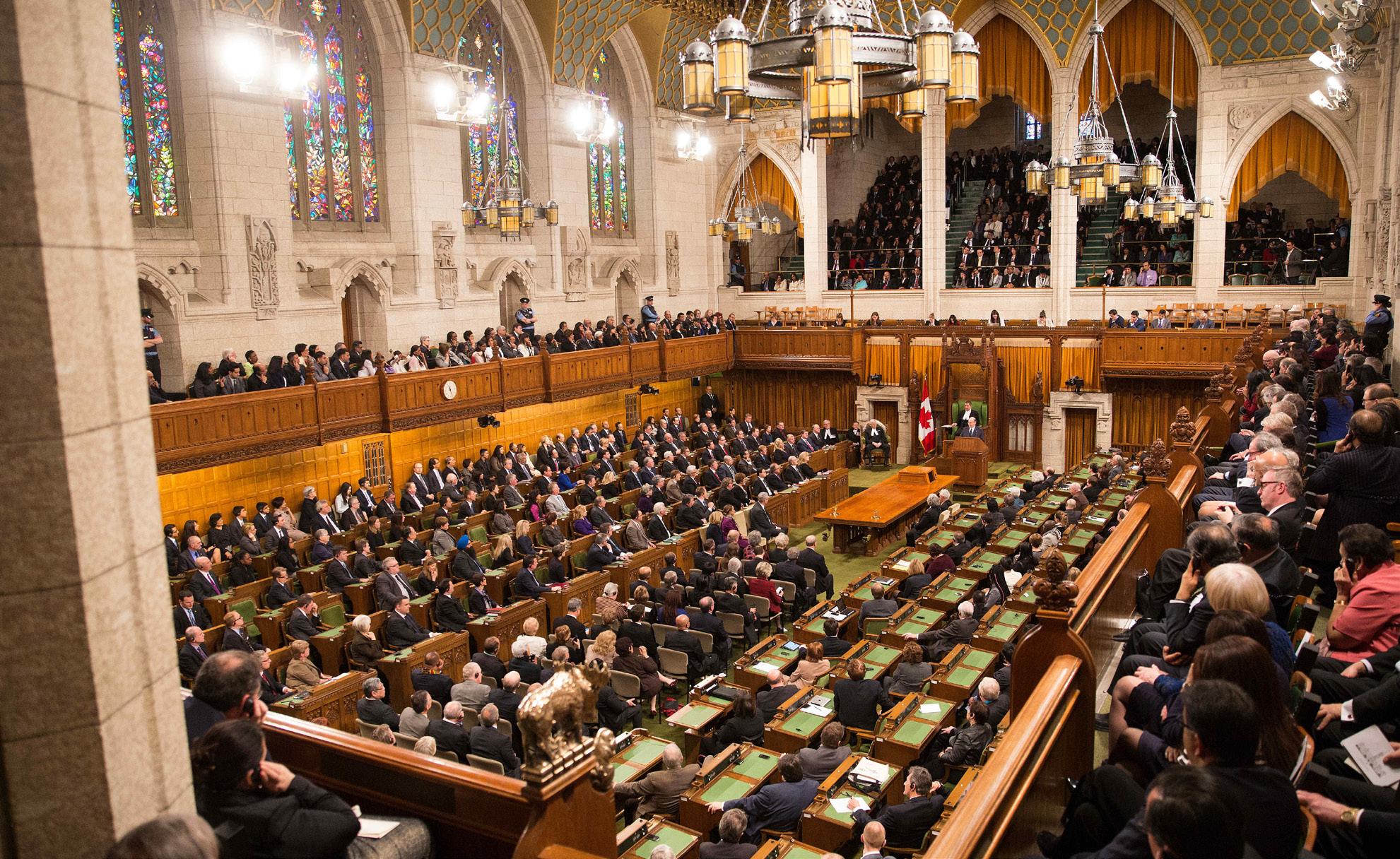
In our findings for the upper chambers of Commonwealth legsilatures, we found that the basic salary of Parliamentarians is the highest in Victoria at AUD $182,413 (USD $130,737.17) per annum. The basic salary of Parliamentarians is lowest in Barbados at BBD $17,748.84 (USD $8,797.67) per annum. Parliamentarians of upper houses in the Australia Region receive the highest salaries of upper house Members in any Commonwealth country. Parliamentarians of upper houses in the CAA Region receive the lowest basic salaries of upper house Parliamentarians across the Commonwealth.
Since 2005, there has been a 32.33% increase in the basic salary of Parliamentarians in the Senate of Canada and a 58.31% increase in the basic salary of Members of the Senate of Australia. The basic salary of upper house Members in parliaments of the CAA region have increased by an average of 17.48% since 2005.
In New South Wales, the Leader of the Legislative Council receives the highest salary, in comparison with the Leader of the Legislative Assembly, who receives no additional salary for the position. In Western Australia, cabinet ministers in the upper house receive the highest salary in that chamber, which is the same as that for a cabinet minister in the Lower House. In Tasmania, the Leader of the Legislative Council receives the same salary as both other cabinet members and the wider Legislative Council membership. This is lower than the salary that the Leader of the Legislative Assembly receives in Tasmania. In Victoria, the Leader of the Legislative Council and the Leader of the Opposition receive the same salary, cabinet ministers also receive the same salary. In the Parliament of Canada, the Leader of the House receives the highest salary and the Opposition Whip receives the lowest salary. In Barbados, the Leader of the Senate is paid the same salary as a cabinet minister and no additional salary is received for this position.
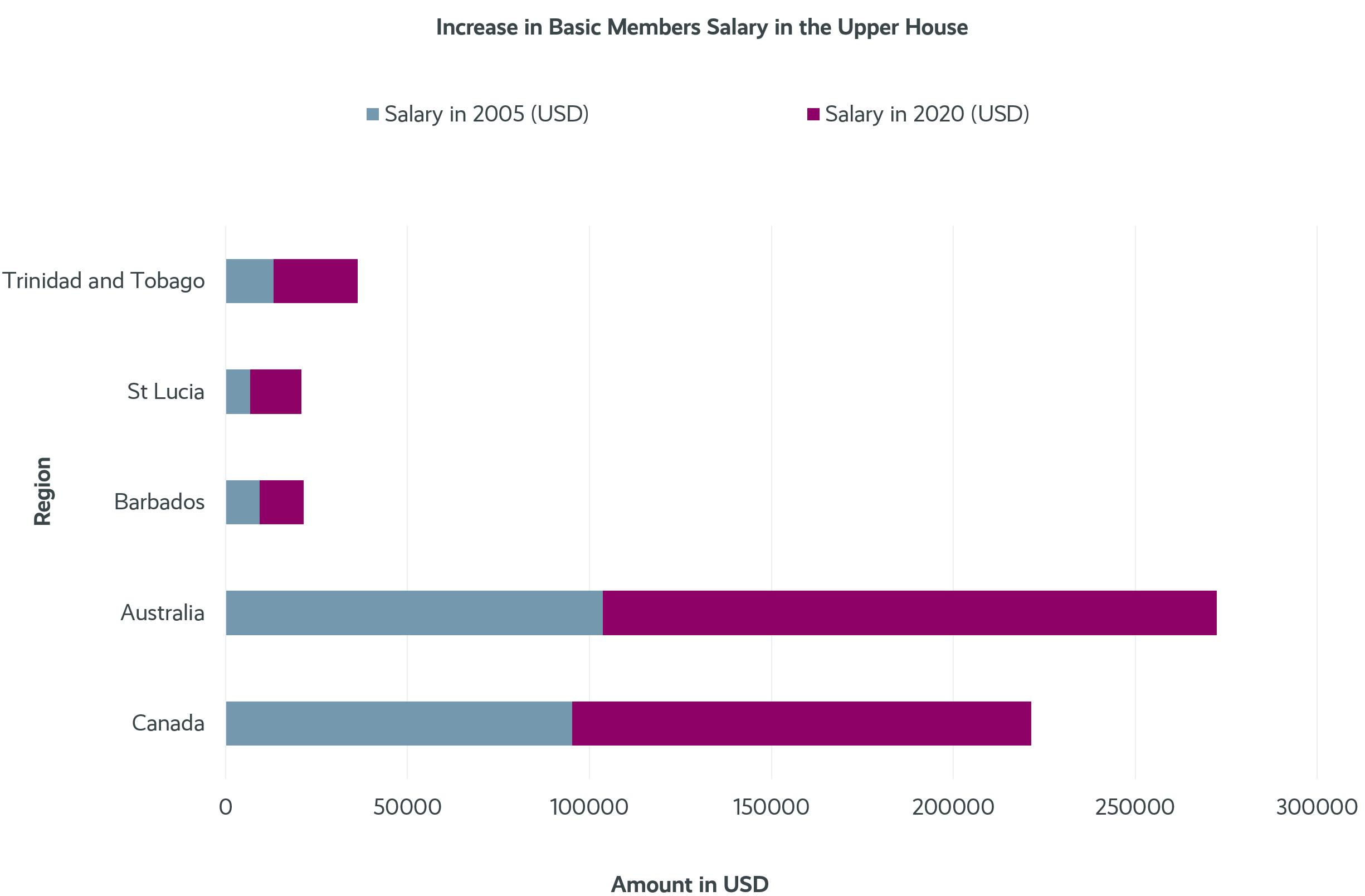
A supreme court or high court senior judge receives the highest salary in comparison with other professions in the Africa, Asia, Australia, BIM, Canada, and CAA Regions. The average salary of a senior judge in the supreme court and high court is higher than the average basic salary of a Member in Africa, Asia, Australia, BIM, Canada, CAA and the Pacific. In the Australia Region, a judge earns approximately 198.74%, or USD $257,732.77, more than the average basic salary of a Member in the lower house. In the BIM Region, this figure is approximately 188.76%, or USD $158,510.82, more. In the Canada Region, it is approximately 219.67%, or USD $184,827.53, more, and in the CAA Region, the difference is approximately 113.84%, or USD $52,332.22, more.
A factory worker receives the lowest salary in comparison with other professions in the Australia, BIM and Canada Regions. This trend is also seen in West Bengal and Kerala. In the Australia Region, a factor worker earns approximately 67% (USD $87,041.04) less than the average basic salary of a lower house Member. In the BIM Region, this figure is approximately 54.47% (USD $38,652.14) less. In the Canada Region, it is approximately 59.97%, or USD $50,461.40, less.
In 2005, there was no legal minimum wage in Australia. The minimum wage now sits at AUD $19.84 per hour. Sarawak has also introduced a minimum wage since our last survey in 2005, which is RM 1,200.00.

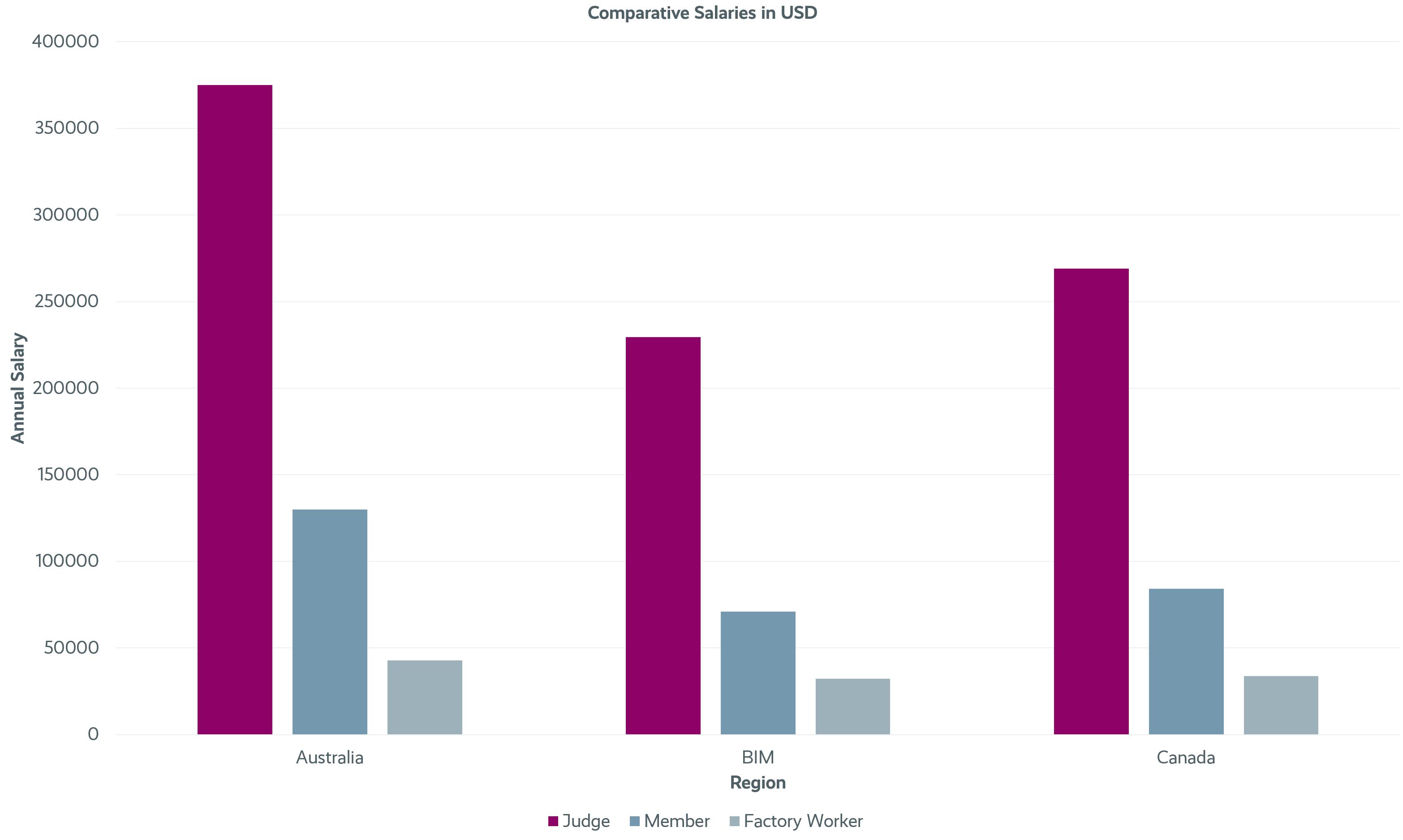
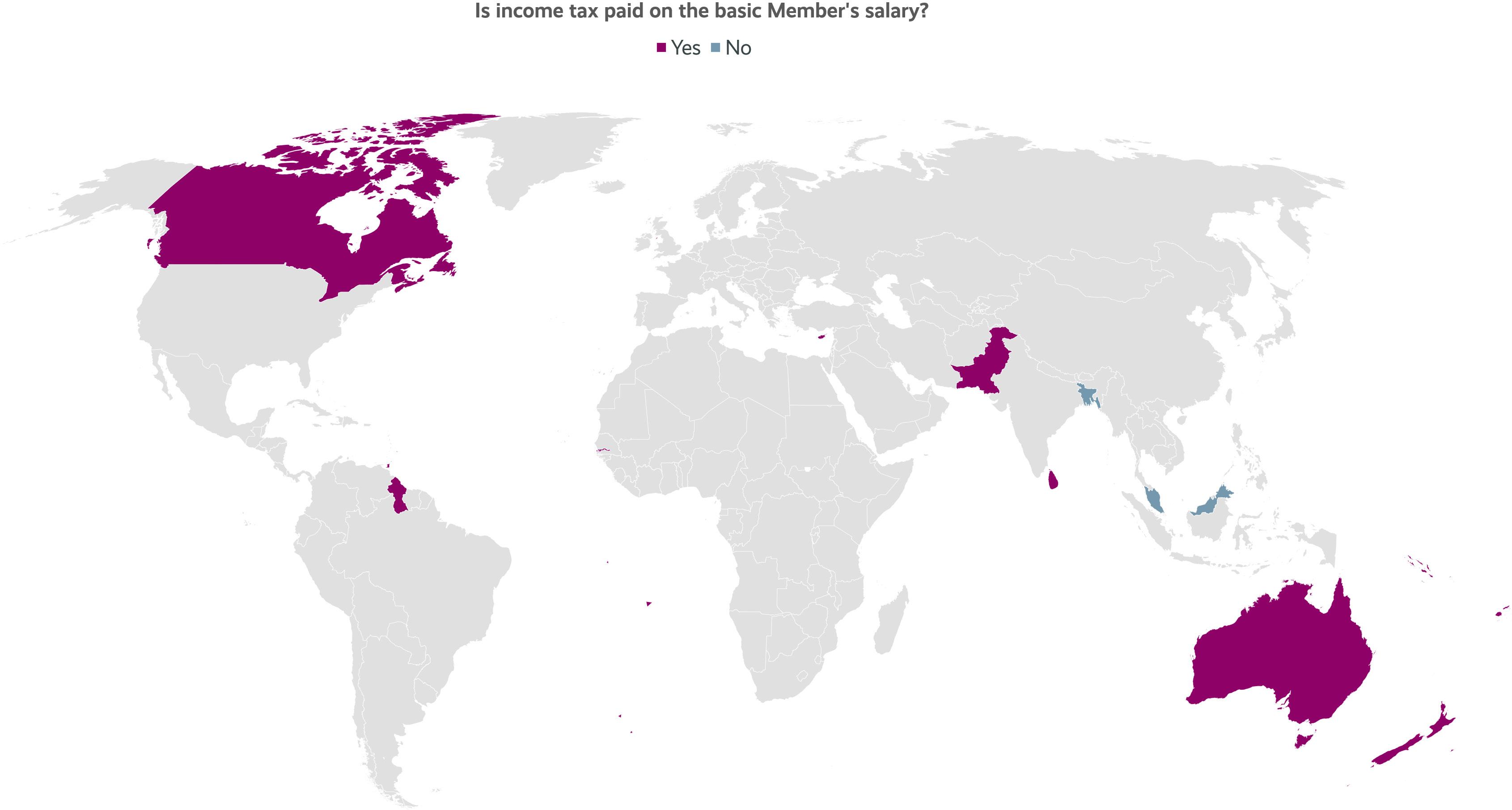
In our findings on income tax, we found that it is paid on the basic salary of Members in the BIM, Canada, India and Pacific Regions. Income tax is not paid on the basic salary of Members in Bangladesh, Bermuda, Malaysia (Federal), Tasmania, and the Turks and Caicos Islands.
Income tax is paid on allowances in the Asia, BIM and SEA Regions. Income tax is not paid on any allowances of Members of Parliament in the CAA Region. Income tax is also not paid on allowances in Bangladesh, Fiji, The Gambia, Isle of Man, Manitoba, New Zealand, Northern Territory, Northwest Territories, Saskatchewan, Solomon Islands, West Bengal, and Zambia.
Since our previous survey in 2005, Sri Lanka has introduced income tax on both allowances and the basic salary of Members. In the Australia Region, income tax was only paid on electorate allowances in 2005. In our most recent survey, the Parliament of Australia states that tax is paid on allowances. In Wales in 2005, income tax was only paid on certain allowances, such as incidental expenses and travel. Similarly to Australia (Federal), tax is now paid on all allowances in Wales. Since 2005, income tax paid on allowances have been introduced in Cyprus, Saint Helena, and Trinidad and Tobago.
In Alberta in 2005, Members of the Legislative Assembly received a tax-free expense allowance equivalent to 50% of the indemnity for expenses incidental to their duties. However, income tax has now been introduced on allowances for Members. In the Legislative Assembly of The Northwest Territories, the first CAD $1,000 of a Member’s basic indemnity was tax-free in 2005. From their reporting on this most recent survey, income tax is now paid on the basic salary of Members.
All Members in the CAA and India Regions are entitled to receive a pension. Members can choose to opt into a scheme in Canada (Federal), New Zealand and Scotland. Members do not receive a pension in ACT, Alberta, Bangladesh, Fiji, Guernsey, Northern Territory, Pakistan, Singapore, South Australia, Tasmania, Victoria, and Zambia. Pension schemes in the India and Asia Regions are not contributory. Schemes in the Pacific are not contributory except for in New Zealand. Likewise, schemes in the BIM Region are contributory except for in Saint Helena. All schemes in the Australia Region are contributory.
In ACT, Isle of Man, Kerala, New Zealand, Punjab (India), Solomon Islands, Saint Helena, Uttarakhand, and Western Cape there is no minimum age requirement for Member’s to serve to qualify for a pension. Throughout the Commonwealth, this length of service varies. In Manitoba, the age and years of service must equal or exceed 55. In Bermuda, Members must be aged at least 55 and have served for 20 years, or be aged at least 60 and have served for 8 years.
Many Branches that provide ongoing benefits to Member’s dependents do so in the case of the passing of a Member. Branches that provide this scheme include Canada (Federal), Cyprus, Isle of Man, South Australia, and Trinidad and Tobago. Benefits for a spouse are provided under Members pension schemes in Canada (Federal), Kerala, Manitoba, Saskatchewan, South Australia, Trinidad and Tobago, and West Bengal. The Canada (Federal), Kerala, South Australia, and Trinidad and Tobago Branches also provide benefits for dependent children under their Members pension scheme.

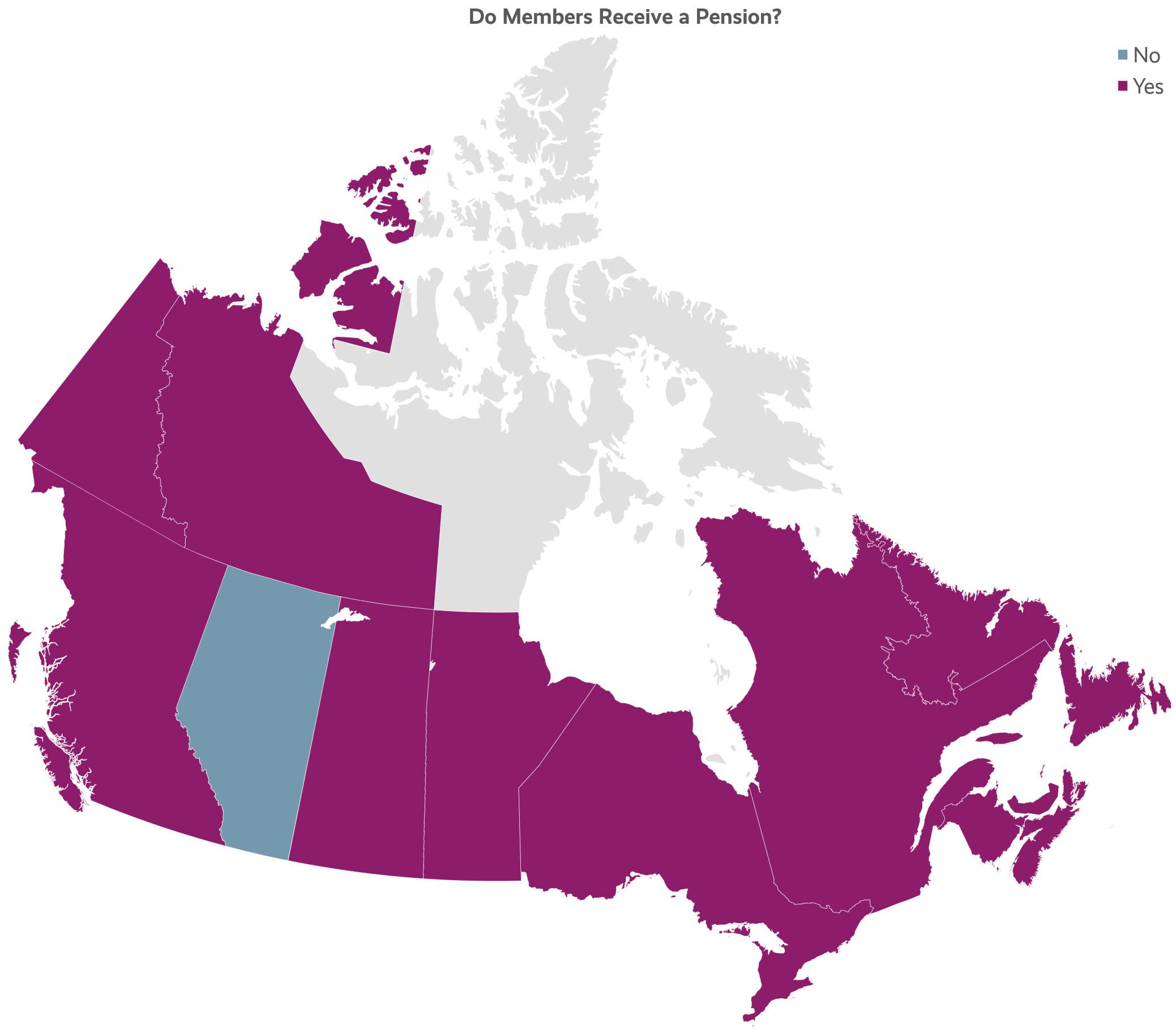
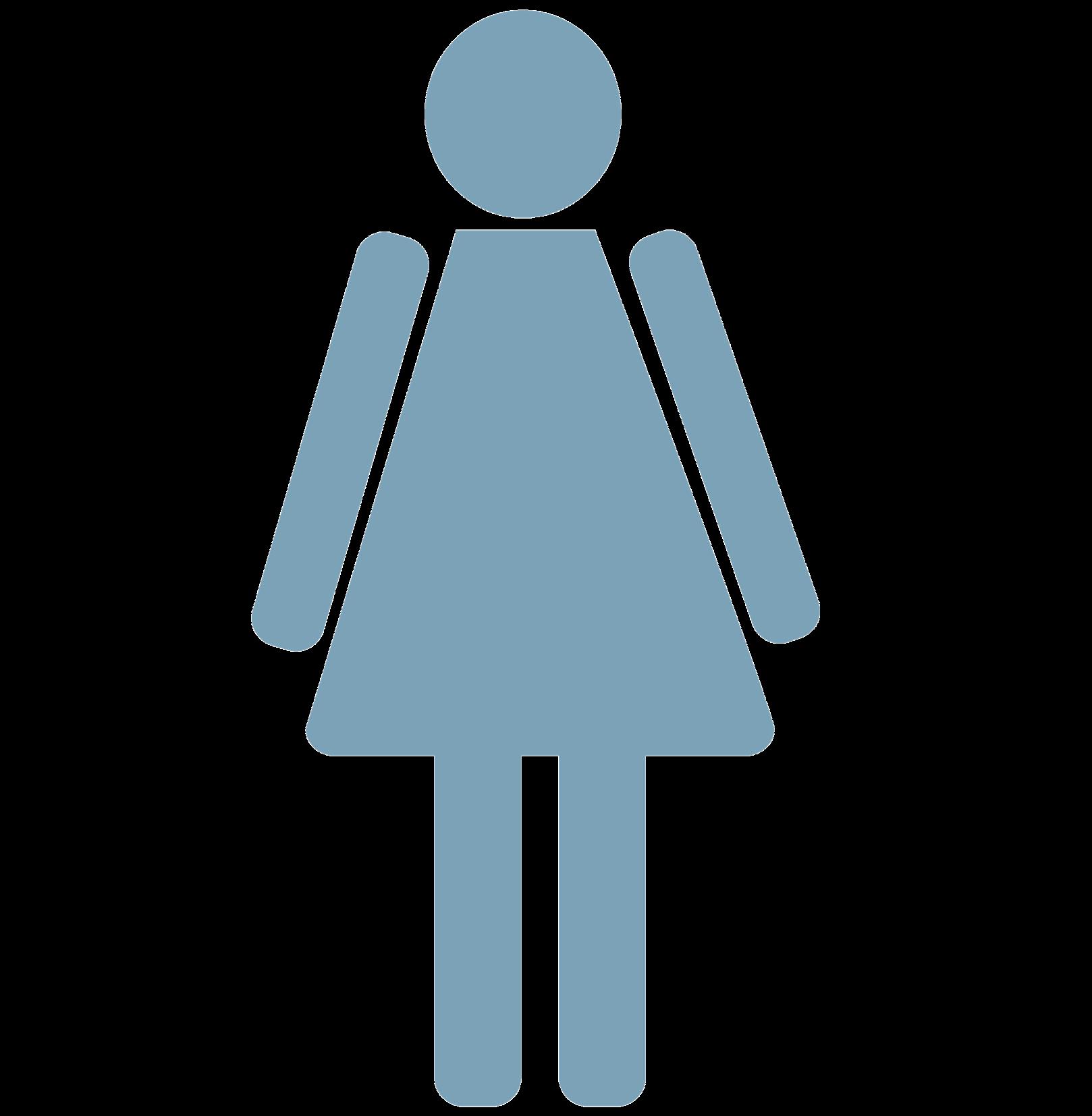

On average, Members in India can draw their pension at 24 years old. On average, Members in Canada can draw their pension at 57 years old.
Throughout the SEA Region, a pension is available to be drawn at 50. In the Australia Region, the age in which a pension can be drawn by Members is slightly older at between 55 and 60. In the BIM, CAA, and Canada Regions, a pension can be drawn between ages 50 and 65. In India (Federal), Members are only required to be 25 to draw their pension.
In Antigua and Barbuda, the age you can draw a pension has been increased from 45 in 2005 to 50. Members of the Legislative Council of Saint Helena did not receive a pension in 2005, and this is something they have introduced since our previous survey. In British Columbia, pensions for Members were eliminated in 1996, this has been reintroduced between 2005 and 2020.
KiwiSaver is a contributionary option pension scheme available to Members in New Zealand.
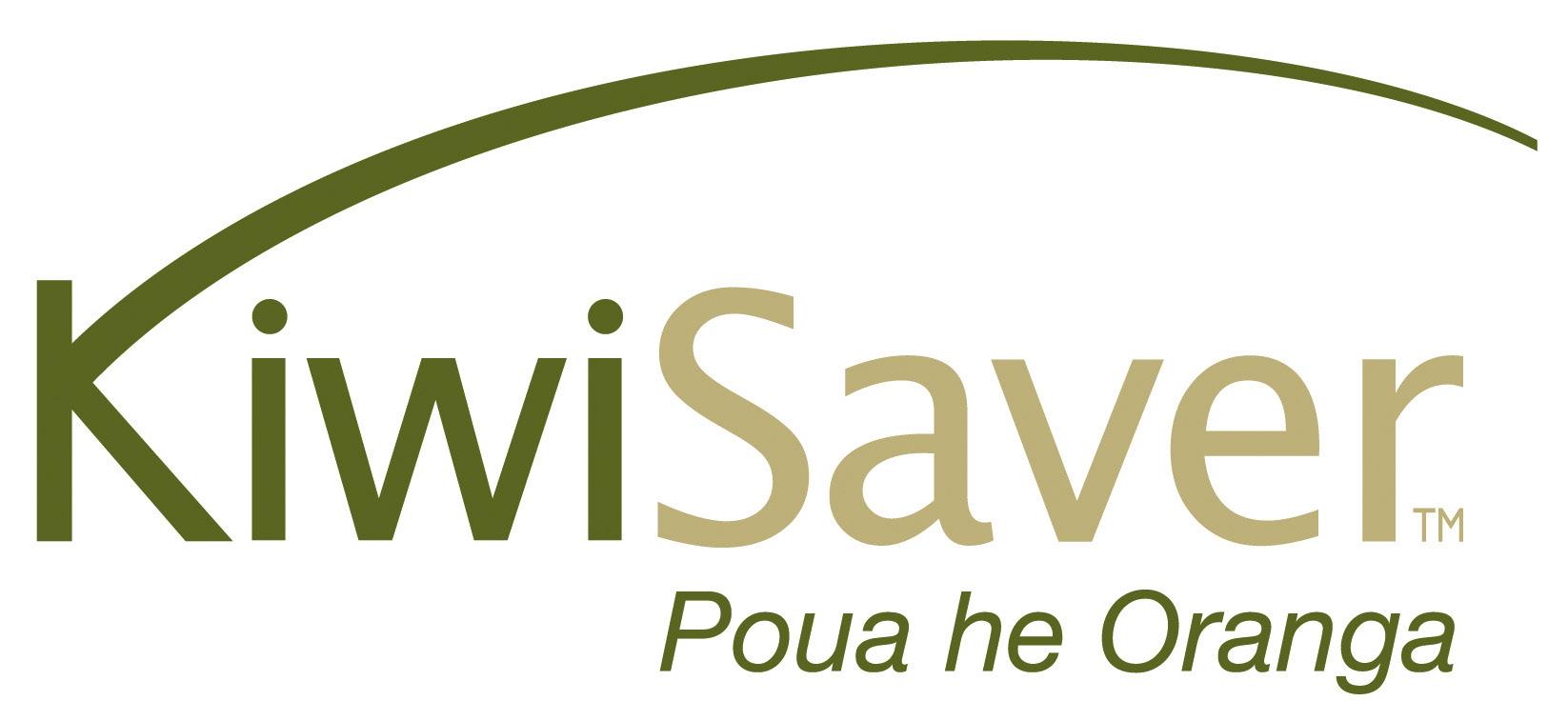
Members receive attendance and/or subsistence allowance in the Asia, India, Pacific, and SEA Regions. In the Australia Region, Members receive an allowance for overnight stays only. In the Canada Region, a travel allowance is provided in Alberta and Saskatchewan, and a living allowance is provided in Canada (Federal) and Manitoba. Bermuda provides an entertainment allowance to Members. ACT, British Columbia, Guernsey, Northern Territory, South Australia, Saint Lucia, Victoria, and Western Cape are Branches that do not provide either an attendance or subsistence allowance to Members.
Members in the BIM and Pacific Regions do not receive either a loan or duty-free concession to purchase a vehicle. Other Regions have a mixed approach. In the Australia Region, Members in ACT, Queensland, and Victoria are provided with a vehicle. Members in South Australia are able to lease a vehicle.
In the Canada Region, Members are not provided with a loan or duty-free concession to purchase a vehicle. However, in Manitoba, cabinet ministers are provided with a car. In Canada (Federal) and Manitoba, Members can claim reimbursement for business travel on a permile basis.
Members in the Africa, Asia, Australia, India, and Pacific Regions receive allowances for travel. Members in the BIM Region do not receive allowances for travel. In British Columbia, Members are provided with a travel expense allowance of CAD $6,000 per fiscal year.

In Queensland, Members are limited to 60 air warrants, each for one way commercial air travel, to attend parliament.
In Singapore, travel allowance is only provided for travel to conferences and official visits.
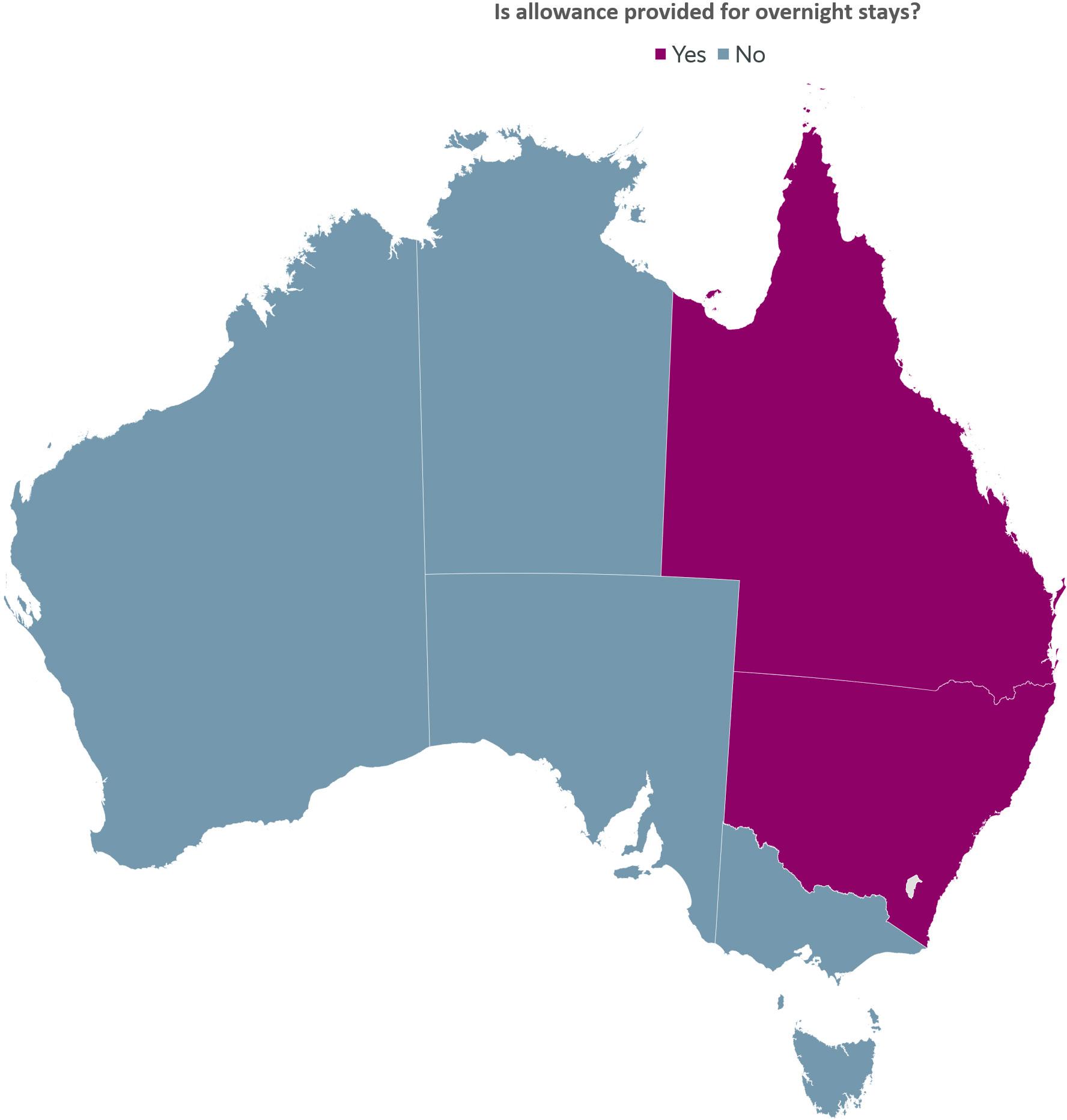
Funds are not provided to Members to finance development projects in their constituencies in the Australia, Asia, BIM, and Pacific Regions. In the Africa Region, Members in The Gambia are allocated a CDF which is available annually.
Members in the Canada Region do not receive funds to finance development projects in their constituencies except for in Manitoba. Members funds in the Legislative Assembly of Manitoba are dependent on the location of Members. For example, in Winnipeg Members receive CAD $6,929 per year, Members in the Southern District receive reimbursement for 65 round trips and have individual constituency base amounts, while Members in the Northern District receive expenses for 52 round trips by air and a base amount of CAD $16,546. In Canada (Federal), this type of funding is not allocated to Members of the House of Commons. In the Parliament of Malaysia, Members in government receive a different amount to support constituency projects in comparison to those in opposition.
Members are covered under a medical plan in the Asia, Canada and SEA Regions. Members are not covered under a medical plan in the Pacific. Branches in the BIM Region do not provide a medical plan except for in Cyprus. Branches in the Australia Region do not provide medical plans with the exception of Queensland, which provides a 24/7 personal accident indemnity policy. Branches in the Africa Region do provide a medical plan with the exception of The Gambia. Malaysia has government hospitals for Members to access. Members in Singapore receive a SGD $500 outpatient subsidy and a SGD $120 dental subsidy annually.
In Australia (Federal), the electorate allowance has increased by an average of 15.73% since our previous survey in 2005. In Canada (Federal), subsistence allowance for Members of the Senate has increased by 35.79% since 2005. In Bangladesh, the allowance for Members attendance has increased by 150% since our previous survey in 2005. In Barbados, subsistence allowance for all Members has increased by 22.06% since 2005. Cyprus have introduced an attendance allowance since our previous survey in 2005, when Members of the House of Representatives were not entitled to receive attendance allowance.
New Zealand includes any allowances provided to its Members as part of their basic salary, rather than as additional funds. The Alberta, Bangladesh, Canada (Federal), Kerala, Punjab (India), Queensland, Saskatchewan, Sri Lanka, Saint Helena, Turks and Caicos Islands, Uttarakhand, and West Bengal Branches all provide allowances in addition to the basic salary of Members on a daily basis.

“1.5.2 An independent body or mechanism should determine the remuneration, benefits and other statutory entitlements of legislators.” Recommended Benchmarks for Democratic Legislatures, 2018.
In our findings it appears that the majority of Regions regulate Members salaries through either independent bodies, government bodies, or through legislation. Members remuneration is reviewed as deemed appropriate in Barbados, British Columbia, The Gambia, Isle of Man, Malaysia, Niue, Pakistan, Punjab (India), Sri Lanka, Saint Helena, Uttarakhand, and West Bengal.
All Branches in the Australia Region, with the exception of Tasmania, review Members remuneration annually. The Canada (Federal), Cyprus, Guyana, New Zealand, Wales, Western Cape, and Zambia Branches also all review Member’s salaries on a yearly basis. Guyana increases Members salary based on increases across the board for other public servants.

The Branches that have gone the longest time without a Members pay review are Sri Lanka, which had its last review on 1 January 2007, and British Columbia, which had their review on 30th April 2007. Neither of these Branches have an expected date to next review salaries. The Branch with the most recent review was the Parliament of South Australia on 7 September 2020. The next expected date of a revision is 1 July 2021. All upcoming reviews for all parliaments, at the time of writing, are expected to take place, or have taken place, between 2020 and 2024.
In India (Federal), the value of allowances is not tied in any way to other measures. This is also the case in The Gambia, Guernsey, Guyana, Isle of Man, Malaysia, New Zealand, Pakistan (Federal), Saint Helena, Saint Lucia, Turks and the Caicos Islands, and Zambia. Tribunals in the Northern Territory, Queensland, and Victoria Branches determine whether the value of allowances are to be tied to any other measures.
The Parliamentary Standards Act 2009 was introduced in the United Kingdom. It made provisions for an independent body to administer and regulate MPs’ expenses.
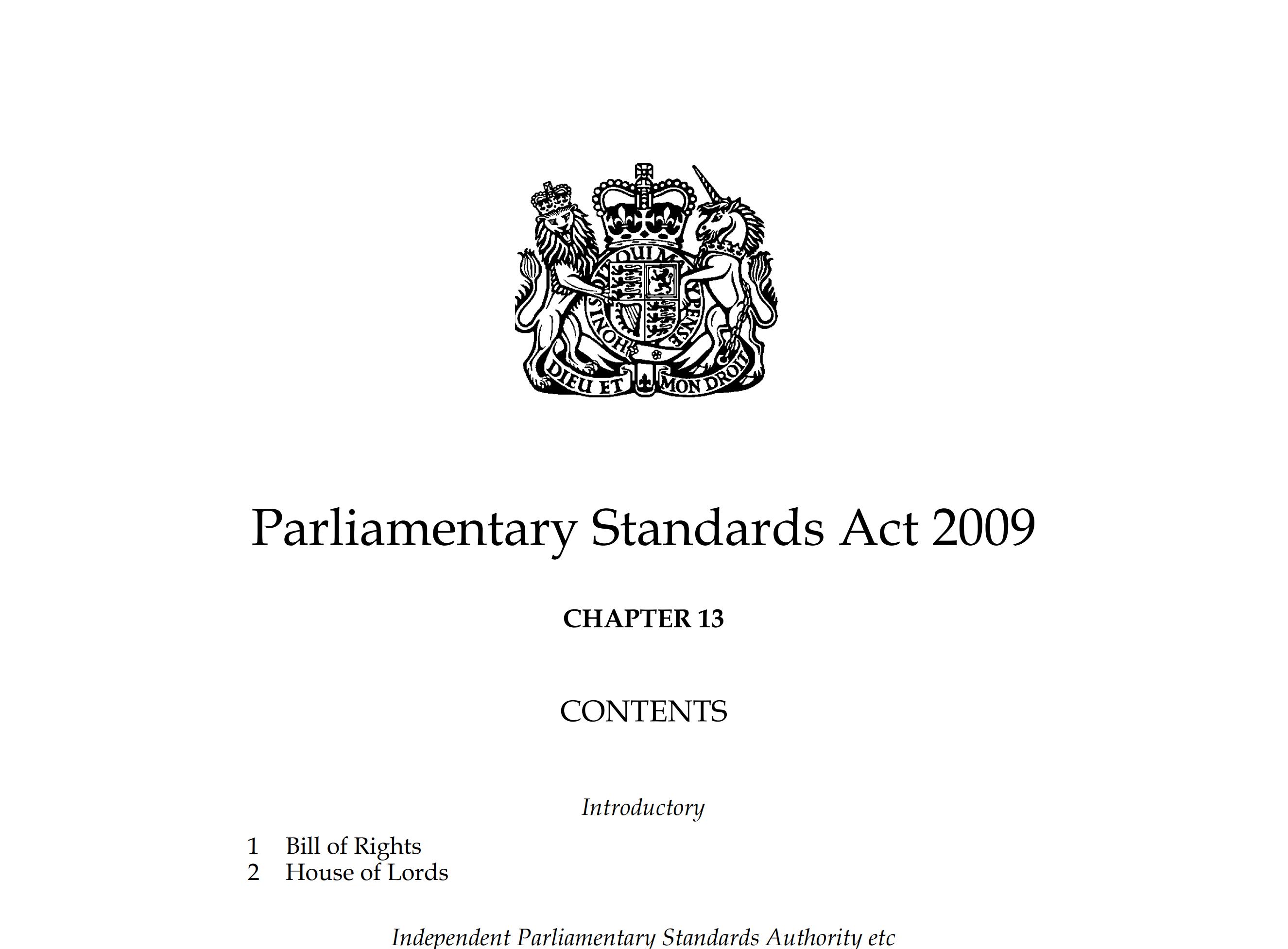
In our findings every parliament responded to the Survey stating that they either publish information on the remuneration of their Members or have it made publicly available. The public can also access Members expense information upon request in ACT, Guyana, Manitoba, Saskatchewan, Saint Helena, Uttarakhand, and Western Cape. In Kerala, Niue, and Singapore, the public are unable to access Member’s expense information upon request.
In our 2005 survey, Guyana stated that the public did not have access to Member’s expense information upon request. This has been introduced in the 15 years since our previous survey. In 2005, the Saskatchewan Branch stated that the public only had access to disclosure statements and were unable to request other expense information. The recent survey confirms that the public do now have access to Member’s expense information upon request in Saskatchewan. In British Columbia, Member’s travel and constituency office expenses are publicly available on a quarterly basis.
In the Parliament of Canada all salaries, allowances, benefits and budgets available to Parliamentarians are published and made publicly available online in the Member’s Allowances and Services Manual. Also, all salaries and travel expenses are disclosed in the Public Accounts of Canada. Furthermore, the Member’s Expenditures Report is published on a quarterly basis, which includes costs incurred by each Member. In Cyprus, there is legislation concerning the declaration of assets and salary and expenses data are provided for each Member separately.
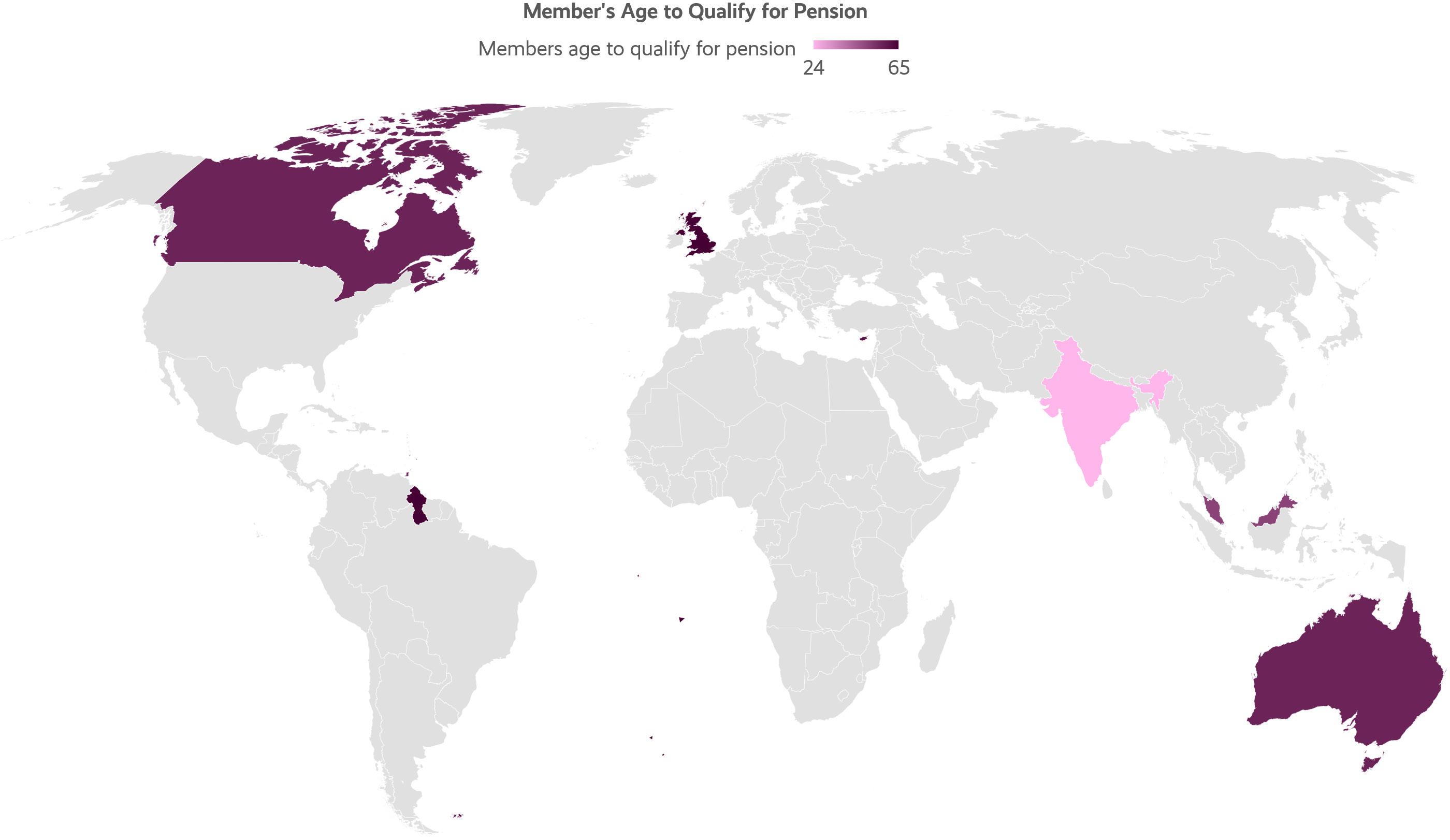
The Gambia, Kerala, Malaysia, Sri Lanka, Turks and Caicos Islands, and Western Cape all make payments to Members who leave Parliament upon retirement or after an electoral defeat. All of these parliaments also do not require Members to pay tax on these payments. ACT, Cyprus, Isle of Man, New Zealand, Northern Territory, South Australia, Victoria, and Wales are Branches that pay Members who leave parliament upon retirement or after an electoral defeat, these payments are taxed. Parliaments in the CAA Region also all pay Members who leave parliament upon retirement or after an electoral defeat. All of these payments are also taxed.

Parliamentarians in Alberta, Bangladesh, Fiji, Guernsey, New South Wales, Niue, Pakistan, Singapore, Saint Helena, Tasmania, Uttarakhand, West Bengal, and Zambia do not make a payment to Members who retire or lose an election. In British Columbia, a former Member receives an amount equal to the basic compensation for a minimum of 4 months. In Cyprus, Members may be entitled to one lump sum payment upon departure. In New Zealand, Members receive three months salary upon departure.
Departing Members receive a transition allowance in British Columbia, Canada (Federal), Manitoba, Northwest Territories, Saskatchewan and Queensland. Members in The Gambia, Malaysia and Saint Lucia receive gratuity upon departure. Members in British Columbia, Canada (Federal), Cyprus, Punjab, Queensland, South Australia, Sri Lanka, and Victoria receive access to their pension upon departure. In Canada (Federal), expenses are provided to Members to relocate within Canada. Members are entitled to a resettlement grant in the Isle of Man. In 2005, New South Wales offered a re-establishment one off payment.
As of our recent survey, departing Members in New South Wales no longer receive any payments. To qualify for transitional assistance in British Columbia, Members must complete their term of office. Members who resign, forfeit their seat, or pass away during their term in Parliament are not eligible for this assistance.
In Barbados, departure payments are taxed at 50%. In Saint Lucia, departure payments are taxed at 25%. In 2005, taxation on payments in Cyprus were dependent on the extent of service and gross emoluments during service at the time of retirement. Now, all departure payments are fully taxed in Cyprus.

In 2005, the ACT, Northern Territories and Turks and Caicos Islands Branches did not make payments to any Members who departed parliament. All of these Branches now make payments to departing Members. For Victoria in 2005, only pension payments were available to departing Members. Now, Members who are not eligible for a pension may be entitled to a ‘separation payment’ dependent on their length of service.
In 2005, Parliamentarians in the Legislative Assembly of Alberta received a transitional allowance. Departing Members in Alberta no longer receive any compensation. Likewise, in Singapore, Members were previously eligible to receive a pension upon leaving parliament. Members in Singapore no longer receive a pension payment. In Zambia, payments were previously made to Members on dissolution of the house. Members no longer receive any payments upon electoral defeat.


